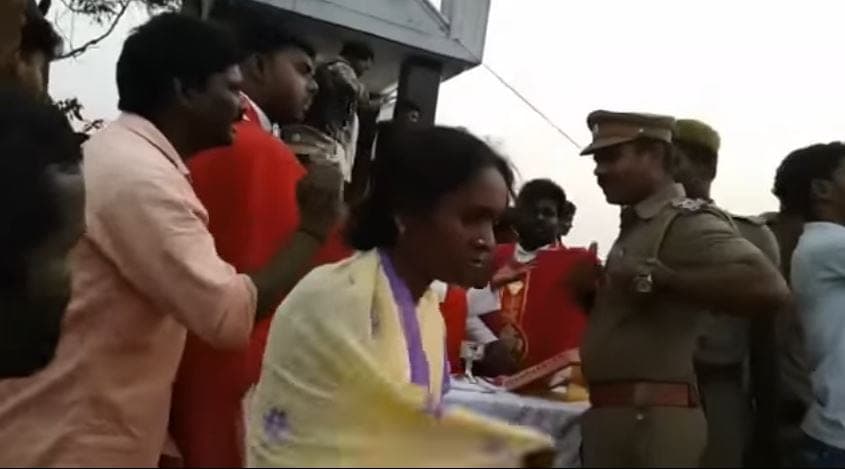MUMBAI, India — Christians in India have denounced the interruption of Good Friday services by government officials in the parish of Sogandi in the Diocese of Chingleput in Tamil Nadu state.
The ceremony was taking place at a hill in the town which the Christians had been using for worship for over 50 years, and on which a Marian grotto was erected in 2007.
Police and revenue officials had surrounded the area before the liturgy of the Lord’s Passion began, and then intruded on the ceremony during the veneration of the cross and distribution of communion.
The next day the revenue department used a bulldozer to dig ditches to deny people access to the area, causing a reaction from the people. Later, the police charged some of the clergy and parishioners with criminal offenses.
The people of Sogandi later met with the district revenue officer and submitted two complaints against the officials of the revenue department, accusing them of deliberately offending the sentiments of the populace.
The Christians of Sogandi predominantly belong to the Dalit caste – formerly known as “untouchable” – and suffer discrimination both on account of their caste and their religion.
The Bishop of Chingleput, A. Neethinathan, issued a statement about the disturbance, blaming the incident on pressure from Hindu fundamentalists.
“As part of its spiritual and pastoral program, the then parish priest of the new parish fostered Marian devotion among the people by developing a portion of the hill slope with the erection of a statue of Our Lady enveloped by a small grotto like covering,” the statement reads. “It was favourably situated facing the parish church inviting people of all faiths to come regularly to pray in front of the statue. The parish also organized periodical liturgical and para-liturgical services for the parishioners, especially on First Saturdays of every month and for Christmas and Holy Week.”
The bishop then described the intolerance that has been shown to the Christian community over the past few months.
“During the period between Christmas and New Year’s Day, 2017 more than 500 police personnel were employed by the revenue department to demolish and remove many of the statues and crosses spread over the hillock under the pretext of illegal occupation and the statues have not been restored to the parish until today,” the statement continues.
“In the month of February every stone boulder on the hill was marked with the Hindu symbol. It is a paradoxically known fact that the other side of the same hill is illegally encroached with more than one temple structure and many housing constructions by the neighbouring villagers who differ from the local Dalit Catholic people of Sogandi village by both religious affiliation and caste identity.”
The bishop goes on to say it “is clear that anti-Christian Hindutva fundamentalism and anti-dalit caste fanaticism are systematically operating in these planned moves and placing undue pressure on the revenue and police departments to place undue pressure on the local Catholics.”
Neethinathan said he is “in no way ready to compromise with the sacrilegious attitude” taken by the revenue officials on Good Friday.
The bishop concludes his statement by stating that, “in protest against this violation of the fundamental right of religious freedom and expression, the diocesan administration is planning for a large scale rally and protest fast in the near future with the goodwill support by and participation of all secular forces irrespective of their caste creed or language affiliations.”
Father Devasagaya Raj, of the Indian bishops’ conference office which works with Dalits told Crux the Good Friday disruption was “very sad.”
“It is nothing but the continuous attack on minorities and Dalits which is the sure sign of right-wing forces in operation,” Raj said. “Generally, Tamil Nadu is a peace-loving community, and it is [currently being] disturbed and the peace is at stake because of emerging right wing forces using government machineries, which is not a good sign.”
Sajan K. George, the President of the Global Council of Indian Christians, told Crux he “denounces the sacrilegious attacks in Tamil Nadu as unacceptable, and we urge the National Human Rights Commission (NHRC) to take suo motu case [on its own authority] against the police and revenue authorities who were silent spectators of the highly reprehensible hate attack and wounding the feeling of hundreds of Christians.”
“Dalits whether they are Christians or Hindus are considered dirty, untouchable and powerless,” said Jesuit Father A.X.J. Bosco.
The priest is the coordinator of the United Front for Dalit Christian Rights and also serves as an advisor for the National Council for Dalit Christians.
“The Christian Dalits in Sogandi are those who got converted apparently to get out of the clutches of the caste people,” Bosco told Crux.
“Whatever the Dalits do to assert their rights, would be considered a revolt,” he said. “Is it possible to bring reconciliation between people who look at Dalits with contempt and hatred and Dalits who feel marginalised and powerlessness? Easter season certainly announces hope to the downtrodden Dalits, reminding them at the same time, ‘Ought not Christ to suffer and thus enter into his glory?’”
Despite the country’s status as a pluralistic, secular democracy, India has long struggled to protect minority religious communities or provide justice when crimes occur, which perpetuates a climate of impunity.
Incidents of religiously-motivated and communal violence reportedly have increased for four consecutive years. The states of Andhra Pradesh, Uttar Pradesh, Bihar, Chhattisgarh, Gujarat, Odisha, Karnataka, Madhya Pradesh, Maharashtra and Rajasthan tend to have the greatest number of religiously-motivated attacks and communal violence.
Religious minorities in India have been subjected to violent attacks, and forced conversions led by right wing groups after the Bharatiya Janata Party (BJP), which is Hindu nationalist, won the 2014 general elections.
Prime Minister Narendra Modi has stated publicly that his government “will ensure that there is complete freedom of faith and that everyone has the undeniable right to retain or adopt the religion of his or her choice without coercion or undue influence.”
















